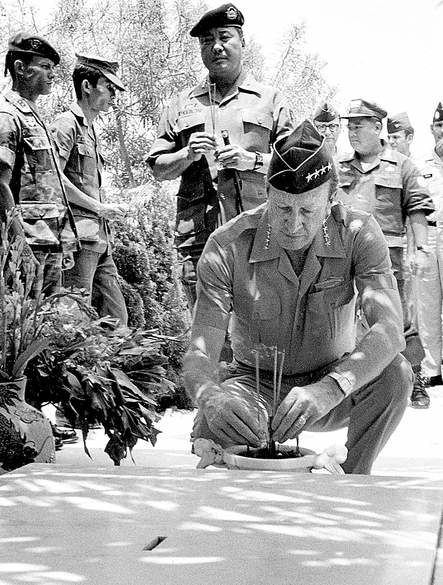Gen. Frederick Weyand was final U.S. commander in South Vietnam
Published 4:00 am Sunday, February 14, 2010

- U.S. Army Chief of Staff Gen. Frederick Weyand places sticks of incense on the grave of a South Vietnamese soldier in 1975 at a cemetery near Saigon, Vietnam. Weyand was the unnamed source in a 1967 New York Times story that suggested victory in Vietnam might have been “beyond reach.”
Retired Gen. Frederick Weyand, a combat veteran of three wars who served as the final commander of American forces in South Vietnam and as Army chief of staff in the waning days of the Vietnam War, died Wednesday in Honolulu. No cause of death was reported. He was 93.
Four decades after the fact, Weyand received attention for statements he reportedly made in 1967 expressing doubts about U.S. prospects for success in the war. He was a top commander in Vietnam at the time and told two prominent journalists, R.W. Apple Jr. of the New York Times and Murray Fromson of CBS News, confidentially that he thought the war had reached an impasse.
According to Fromson, in a 2006 New York Times opinion article, Weyand was the unnamed source in an explosive Times story by Apple on Aug. 7, 1967, that suggested victory in Vietnam might have been “beyond reach.” Fromson, who also reported on the general’s doubt, wrote that Weyand released him from the confidentiality agreement after the 2005 death of Gen. William Westmoreland, who had been commander in Vietnam at the time of Weyand’s comments.
In 1964, when he took over the 25th Infantry Division in Hawaii, which he would soon lead into Vietnam, Weyand had a reputation as a shrewd leader who knew military combat as well as political infighting. During World War II, he served as an intelligence specialist in the China-Burma-India theater. When he was in his 30s, he commanded an infantry battalion in Korea. He had been the Army’s liaison to Congress, an edifying assignment given the role awaiting him in the most politically divisive war in modern American history.
On the battlefield in Vietnam, Weyand presciently advised Westmoreland to deploy troops closer to Saigon weeks before the North Vietnamese launched in 1968 what would become known as the Tet Offensive. According to a 1972 New York Times article, Westmoreland said that having the troops ready was one of the most important decisions of the war. In 1969 and 1970, Gen. Weyand served as military adviser to Ambassador Henry Cabot Lodge Jr. during the Paris peace talks on Vietnam.
Frederick Carlton Weyand was born in Arbuckle, Calif., on Sept. 15, 1916. The son of a police chief, he studied criminology at the University of California, Berkeley, and graduated in 1939 with an ROTC commission as a second lieutenant. His military decorations included the Distinguished Service Cross, the Distinguished Service Medal, the Silver Star, the Legion of Merit and the Bronze Star Medal.
Years after the Vietnam War, Weyand sought to dispel what he considered unfair impressions left from the deeply divisive conflict. In interviews with military affairs writer Col. Harry Summers Jr., he spoke about the “cruel misperception that the American fighting men there did not measure up to their predecessors in World War II and Korea.”
In his view, American policymakers had failed to articulate clear and reachable goals the American public could embrace. He also found fault with the military leadership.






